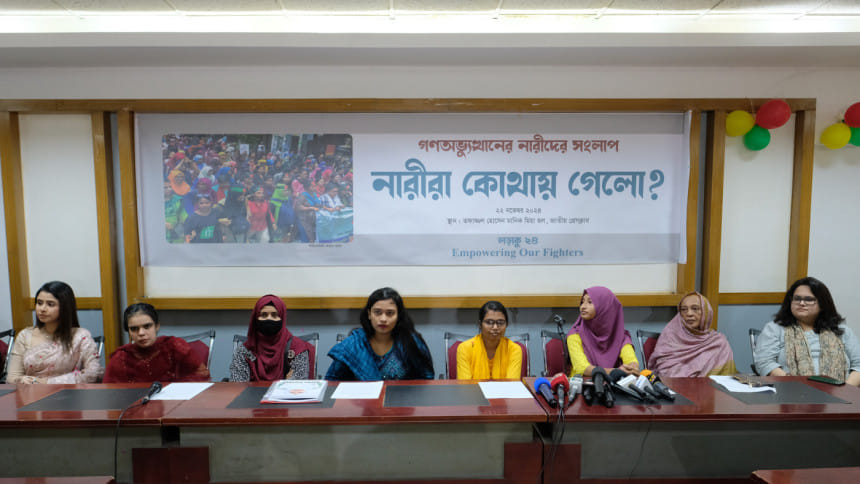July uprising: Women activists feel sidelined and forgotten

Women leaders and activists, who actively participated in the July uprising, yesterday said despite their contributions at every level, they have been systematically sidelined in the post-movement period.
They pointed out that equal representation of women was not ensured in the reform commissions or other state institutions.
They added that the longstanding culture of denying women their rightful roles and excluding them from various sectors continues unabated.
They made these remarks at a discussion titled "Dialogue on Women of the Mass Uprising: Where Did the Women Go?" held at the Jatiya Press Club, where injured participants and female activists shared their experiences.
The event was jointly organised by two volunteer organisations, Loraku 24 and Empowering Our Fighters.
Umama Fatema, spokesperson for the Anti-Discrimination Student Movement, said it has become evident that there was a deliberate and successful attempt to sideline women in the aftermath of the uprising.
"When male leaders were arrested, women stepped up to lead and continued until August 5. But after that, I was completely sidelined. Attempts were made to portray men as the heroes of the movement, and I began experiencing an identity crisis," she said.
"Women leaders were harassed on social media, and those in power took no action. This further marginalised the women who participated in the movement," she added.
Nazifa Jannat, a student of East West University and coordinator during the movement, said, "It is deeply unfortunate that we are now compelled to assert that we, too, were part of the movement."
"People are asking, 'Where are the women now?' This question should be directed at the political parties that, despite their capacity, failed to include women," she said, calling on the media to raise such questions.
She emphasised the importance of increasing women's representation in positions of power.
"Women should not have to demand recognition for their roles; it is the state's responsibility to acknowledge them. We protested against discrimination in the past, and we did so to eradicate all forms of inequity," she said.
Dr Worthy Jukhrif, who provided medical aid alongside Dr Hritisha Aktar Mitheen to over 100 injured persons during the uprising, said, "We believe women should be equally represented in every sector of the state, including the Reform Commission, to eliminate all forms of discrimination."
Jannatul Ferdous Nitu, a second-year student at Barisal Government College, said, "No female students were included in the advisory council. Even though one woman was named spokesperson for the main committee, she has been noticeably absent in press releases and other activities," she said.
Samia Akhter Jannat, a tenth-grade student who was injured multiple times during the movement, said not only are women's contributions unacknowledged, but they are also being deliberately excluded.
Sabina Yasmin, a protester and female labourer from Ashulia, observed, "Many labelled the uprising as a student movement. In reality, labourers, including female workers, participated spontaneously. Many women were injured or killed, yet their sacrifices remain unrecognised."
Sumaiya Nishu, a student from Noakhali, pointed out, "While women in Dhaka have some visibility in state affairs, women from outside Dhaka are completely overlooked."
Sabrina Akhter, a student from Begum Rokeya University, said, "Despite our active participation, the media continues to focus primarily on men, perpetuating past inequalities against women."
Shamima Sultana Labu, a senior journalist from Channel 24 who was injured during the movement, explained, "During the movement, press secretaries monitored media houses, and we were even temporarily taken off-air. Yet, we persisted. The footage we couldn't air domestically, we shared with international media."
She added that while a small number of media personnel were compromised, the entire journalist community often bears the brunt of public anger.
The event was inaugurated by Ainun Nahar, the mother of Naima Sultana, a student killed during the uprising.
Recalling her daughter's aspirations to become a doctor, Ainun said, "We moved to the city for her education, but her death shattered all our dreams. My daughter even argued with me when I discouraged her participation in the movement."
She urged the inclusion of the uprising and its martyrs in textbooks and demanded punishment for those responsible for the killings.
The event also featured speeches from women who played significant roles in rehabilitating injured and bereaved families from abroad.

 For all latest news, follow The Daily Star's Google News channel.
For all latest news, follow The Daily Star's Google News channel. 



Comments